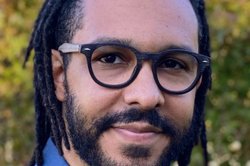Dr. Tyce Nadrich ’19
Counseling
Posted in: Spotlights

Dr. Tyce Nadrich PhD, LMHC, NCC, ACS
Professor Clinical Mental Counseling
Molloy College
When asked to reflect on what he remembers most while a student at Montclair State University, Dr. Nadrich candidly expressed, “It was the people I met during my time there.” He further states that he counts these people as dear friends and colleagues. “Had it not been for the university and this program particularly, I would not know these people. I cannot imagine my life without them”.
Dr. Nadrich continues to work to expand his dissertation thesis on racially mixed people of color. He has actively engaged in many projects and publications. He has co-authored articles on black men in higher education specifically in the counselor education program. He is currently working on a manuscript exploring the CACREP process of accreditation and how CACREP accreditation affects certain institutions. He recently received a grant to conduct a study to examine how Institutions are integrating the social justice competencies within their pedagogy.
He recognizes that the practice of mental health has shifted specifically in the realm of telehealth. Therefore, training needs to be tailored to the new experience. “As counselor educators, we should also focus on training and learning the skills for telehealth. Get the CEUs because I don’t see telehealth going anywhere anytime soon.”
Dr. Nadrich believes that counselors should focus on the fragmented identity of the profession and mental health counselors. How can counselors unify our identity as counselors not only to the world so that they would know who we are, but also so that we know who we are. He recognizes that it takes legislation and lobbying and money, but we need to invest in people. “Spending money up front to save money in the long run is a good thing.”
For future counselors, Dr. Nadrich says: “Find your way through social justice and advocate for others. If you can’t march, make the signs. It’s easy to feel that those that are marching on the streets are more important than you, but as long as what you are doing is congruent with who you are, then do it.”
